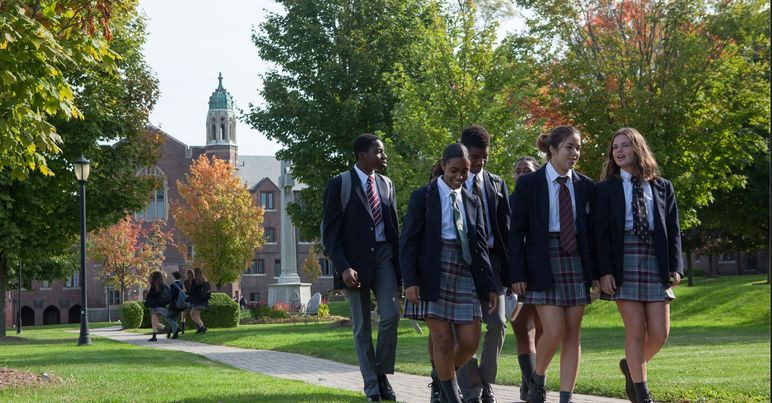
“When it comes to schools, especially high schools, there is research suggesting that school size is even more important than class size,” says Stuart Grainger, head of Trinity College School (TCS) in Port Hope, Ontario. “For years, I’ve been following the work of Thomas Sergiovanni, Professor of Education at Trinity University, San Antonio. His research on building communities within schools confirms that belief.”
So what is the ideal size for a high school, and how does school size impact student life? According to Grainger, “Smaller is better, but the smallest isn’t necessarily the best.”
Sound complicated?
The premise is that socialization is especially important for high school students and, as such, there must be enough students within a school for individuals to find people they can connect with and forge relationships with. At the same time, the school should be small enough to create an environment in which a student can feel seen, heard, and part of a community.
“The research shows that the sweet spot for a high school is anywhere from 350 to 500 students,” says Grainger. “Students in a school of this size tend to be more successful both within school and upon graduation.”
When exploring the factors influencing student success, Grainger says they include the variety of programs a school offers, both curricular and co-curricular, the opportunities students have to connect with like-minded and like-motivated individuals, and students’ ability to feel that they matter to the adults in the building.
“Purposeful engagement, meaningful relationships, and the opportunity to shine and support other students are keys to success,” Grainger says. “As we know, the ability to learn successfully is often based on a student knowing they have relevance, purpose, and that they matter to the people around them.”
As many studies have shown, there is a marked relationship between learning and feeling safe and cared for. The more a student feels safe and connected, the more likely they are to take risks, explore their abilities, and be successful. “Kids do best in communities where there are bonds and connections between students and teachers, and peer connections among the students. This interdependency leads to positive outcomes.” For Grainger, it’s essential to create an environment where teachers and school leadership know students personally and can look out for their well-being.

Grainger has been at TCS for two decades, and while the demand during that period could have contributed to enrolment growth, TCS committed to keep the size of the Senior School under 500 students. “We believe that both school size and class size are fundamental and critical factors in enhancing education.”
Beyond sheer numbers, TCS is also attentive to its student body makeup. “The composition of a school, in addition to the size, is also important,” says Grainger.
“When you look at the kids in your school, where do they come from, what groups are represented, and do all students feel welcome?” These are questions Grainger and the leadership team continually think about. “For starters, we are a school where all genders are welcome,” he says. “In 1991, we changed from an all-boys school and adopted a co-educational model.” Another transition took TCS from a predominantly boarding school to a boarding and day school featuring domestic boarding students, international boarders from over 40 countries, and day students.
Just like TCS’s diverse programming, its attention to school size and student population stems from the goal of creating an ideal learning environment. “We know it takes a village to raise a child, and that concept of community and the village has been threatened over the past 25 years,” Grainger says. “Technology has made it easier for people to do things in isolation. If there was one lesson we learned during the pandemic, it’s that young people need to be connected with others, participate in purposeful activities, and be surrounded by peers and caring adults in a community setting. Human connections matter.”
Many independent and private schools consider class size and student-to-teacher ratio as important benchmarks when evaluating the student experience. For TCS, commitment to the optimal school size is part of a deeper commitment to creating a community-focused learning environment. As Grainger explains, "We intentionally differentiate ourselves by size. We focus on nurturing authentic relationships and we do so by keeping our numbers small and making community our priority.”











